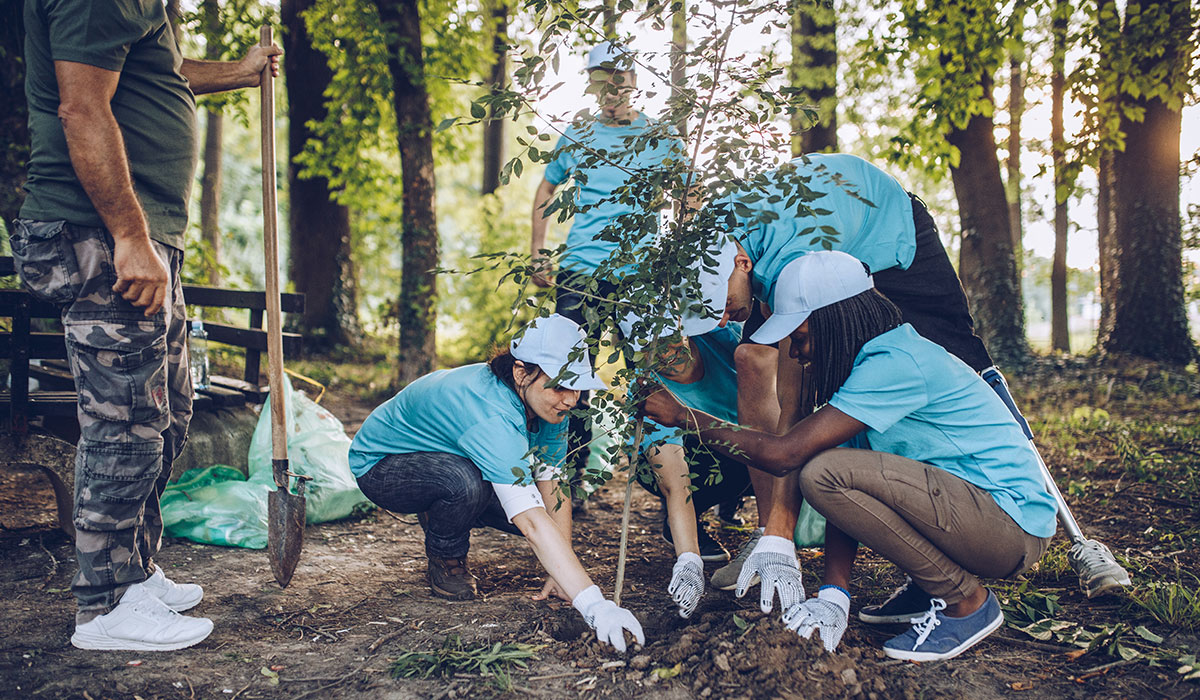How can a business be involved in the community?
Many SME owners want to give something back but aren’t sure what to do or how. With so many business-related projects vying for attention, it can slip down the list of priorities. But with a few simple actions, you can choose a community project that’s right for you and your firm.
Potential activities include:
-
offering financial support for local causes - for example, a fundraising event run by employees
-
allowing staff one or more days for volunteering, such as planting trees, helping at a food bank or beach clean-ups
-
reacting to local calls for help - for example, for extra food donations or support for a local cultural venue
-
inspiring others by communicating how you tackle local sustainability issues
-
supporting schools - for example, offering talks and work-experience opportunities
-
partnering with local charities and community groups for one-off events or ongoing support.
This choice may seem overwhelming at first. To narrow it down, appoint a community-engagement lead or champion in your business. This could be a volunteer, part of someone's job description or a standalone role.
This appointment will create a contact point for the community; help you give back in a strategic and impactful way; and embed a charitable, community-minded culture in your business. Your community lead can help you embed a giving-back culture into your business plan, outlining values, purpose, and environmental, social and governance (ESG) targets.
They should also ask your employees if there are any local causes they feel passionate about, and lead a regular community-engagement meeting.
How to measure your efforts
To understand the impact of your activities, gather feedback from those involved with the cause you support - for example, ask how useful your company's contribution was and whether they would like your help again. Then include your activities and outcomes in an impact report and your firm’s annual report.
Jess says: “Planet & People record how we have supported our local community. The core is through fundraising for workshops on environmental themes. We use donations from schools to extend the reach of this impactful work through our Planet Action Fund.
“This allows us to act on the community’s needs, support the ideas of children attending our school workshops and contribute to wider projects that require educational resources. We also let donors know how the funds have been allocated and the impact by creating stories to communicate this with our followers and our team to motivate and inspire.”
Communicating targets and goals can be as simple as putting a regular slot in your newsletter, sharing social-media links or highlighting campaigns on your email signature.
Aligning actions with vision
How can a business be involved in the community?
Many SME owners want to give something back but aren’t sure what to do or how. With so many business-related projects vying for attention, it can slip down the list of priorities. But with a few simple actions, you can choose a community project that’s right for you and your firm.
Potential activities include:
-
offering financial support for local causes - for example, a fundraising event run by employees
-
allowing staff one or more days for volunteering, such as planting trees, helping at a food bank or beach clean-ups
-
reacting to local calls for help - for example, for extra food donations or support for a local cultural venue
-
inspiring others by communicating how you tackle local sustainability issues
-
supporting schools - for example, offering talks and work-experience opportunities
-
partnering with local charities and community groups for one-off events or ongoing support.
This choice may seem overwhelming at first. To narrow it down, appoint a community-engagement lead or champion in your business. This could be a volunteer, part of someone's job description or a standalone role.
This appointment will create a contact point for the community; help you give back in a strategic and impactful way; and embed a charitable, community-minded culture in your business. Your community lead can help you embed a giving-back culture into your business plan, outlining values, purpose, and environmental, social and governance (ESG) targets.
They should also ask your employees if there are any local causes they feel passionate about, and lead a regular community-engagement meeting.
How to measure your efforts
To understand the impact of your activities, gather feedback from those involved with the cause you support - for example, ask how useful your company's contribution was and whether they would like your help again. Then include your activities and outcomes in an impact report and your firm’s annual report.
Jess says: “Planet & People record how we have supported our local community. The core is through fundraising for workshops on environmental themes. We use donations from schools to extend the reach of this impactful work through our Planet Action Fund.
“This allows us to act on the community’s needs, support the ideas of children attending our school workshops and contribute to wider projects that require educational resources. We also let donors know how the funds have been allocated and the impact by creating stories to communicate this with our followers and our team to motivate and inspire.”
Communicating targets and goals can be as simple as putting a regular slot in your newsletter, sharing social-media links or highlighting campaigns on your email signature.
Aligning actions with vision
How can a business be involved in the community?
Many SME owners want to give something back but aren’t sure what to do or how. With so many business-related projects vying for attention, it can slip down the list of priorities. But with a few simple actions, you can choose a community project that’s right for you and your firm.
Potential activities include:
-
offering financial support for local causes - for example, a fundraising event run by employees
-
allowing staff one or more days for volunteering, such as planting trees, helping at a food bank or beach clean-ups
-
reacting to local calls for help - for example, for extra food donations or support for a local cultural venue
-
inspiring others by communicating how you tackle local sustainability issues
-
supporting schools - for example, offering talks and work-experience opportunities
-
partnering with local charities and community groups for one-off events or ongoing support.
This choice may seem overwhelming at first. To narrow it down, appoint a community-engagement lead or champion in your business. This could be a volunteer, part of someone's job description or a standalone role.
This appointment will create a contact point for the community; help you give back in a strategic and impactful way; and embed a charitable, community-minded culture in your business. Your community lead can help you embed a giving-back culture into your business plan, outlining values, purpose, and environmental, social and governance (ESG) targets.
They should also ask your employees if there are any local causes they feel passionate about, and lead a regular community-engagement meeting.
How to measure your efforts
To understand the impact of your activities, gather feedback from those involved with the cause you support - for example, ask how useful your company's contribution was and whether they would like your help again. Then include your activities and outcomes in an impact report and your firm’s annual report.
Jess says: “Planet & People record how we have supported our local community. The core is through fundraising for workshops on environmental themes. We use donations from schools to extend the reach of this impactful work through our Planet Action Fund.
“This allows us to act on the community’s needs, support the ideas of children attending our school workshops and contribute to wider projects that require educational resources. We also let donors know how the funds have been allocated and the impact by creating stories to communicate this with our followers and our team to motivate and inspire.”
Communicating targets and goals can be as simple as putting a regular slot in your newsletter, sharing social-media links or highlighting campaigns on your email signature.
Aligning actions with vision






